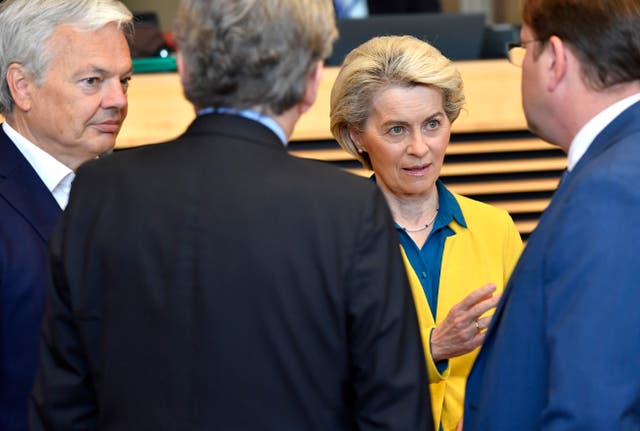
Rachel Johnson 7pm - 10pm
17 September 2024, 12:24

Six women are among the eight top positions in the European Commission president’s top team.
European Union chief Ursula von der Leyen put women in many of the top roles of her new team for her next five-year tenure at the head of the bloc on Tuesday after many EU member states had been reluctant to live up to her demand for gender parity.
Ms Von der Leyen appointed only two men in her top echelon with four women as vice presidents, including Kaja Kallas as foreign policy chief. Ms Kallas was already agreed on by government leaders.
The EU chief also added Spanish Socialist Teresa Ribera to lead the green transition and become the competition tsar. Finland’s Henna Virkkunen was her pick for rule of law and digital leader and Roxana Minzatu of Romania for social affairs leader.
Ireland’s former minister for finance Michael McGrath was named the EU’s next Commissioner for Justice. He will be responsible for leading the EU’s efforts to tackle breaches of the rule of law by member states. He will also lead the EU’s work on anti-corruption and consumer protection.
Ms von der Leyen gave foreign minister Stephane Sejourne the industrial portfolio, after French heavyweight Thierry Breton resigned and openly criticised the EU chief for allegedly “questionable governance”.
Every member of my team will bring in their own experience and perspectives on Europe. Together, we will be one team, working towards one common goal. To make Europe stronger. pic.twitter.com/xIvDNv4C7t
— Ursula von der Leyen (@vonderleyen) September 17, 2024
It left France with a strong voice in the Commission, and many saw Mr Breton’s shock resignation more as a removal by Ms von der Leyen of one of her most open internal critics after exerting pressure on French authorities.
Compounding such problems was the defiance of many of the 27 member states as Ms von der Leyen struggled to get anywhere close to gender parity on her Commission team — they staunchly refused to give her a choice between a male and a female candidate.
She said that originally, EU nations only proposed 22% female candidates before she started to push for more.
“So I worked with the member states and we were able to improve the balance to 40% women and 60% men. And it shows that, as much as we have achieved, there is still so much more work to do,” she said.

If she could not get full gender parity in numbers, Ms von der Leyen made sure they were more than well-represented in the top jobs.
After days of secret talks with individual European governments about their picks, Ms von der Leyen huddled with the leaders of the political groups at the European Parliament in Strasbourg, France, to discuss the make-up of her college before making the final announcement.
Even if the Commission’s makeup has hardly become the talk of bar rooms or barber shops across the vast EU of 450 million people, it has enthralled the upper echelons of politics and bureaucracy, as they sought to boost one candidate or undermine another.
The Commission proposes legislation for the EU’s 27 member countries and ensures that the rules governing the world’s biggest trading bloc are respected. It is made up of a college of commissioners with a range of portfolios similar to those of government ministers, including agriculture, economic, competition, security and migration policy.

The Commission is to start work on November 1, but speculation is rife that it might not get down to business before January.
A former German defence minister, Ms von der Leyen has been pressing smaller countries to change their minds. In recent weeks, a man who was the preferred candidate of the government in Slovenia withdrew and a woman was proposed in his place.
She decides which country gets which portfolio, and some of them, like those involving trade or finance or EU enlargement, are coveted by certain countries. Key roles such as vice president — the commission has seven of these — are also much sought after.